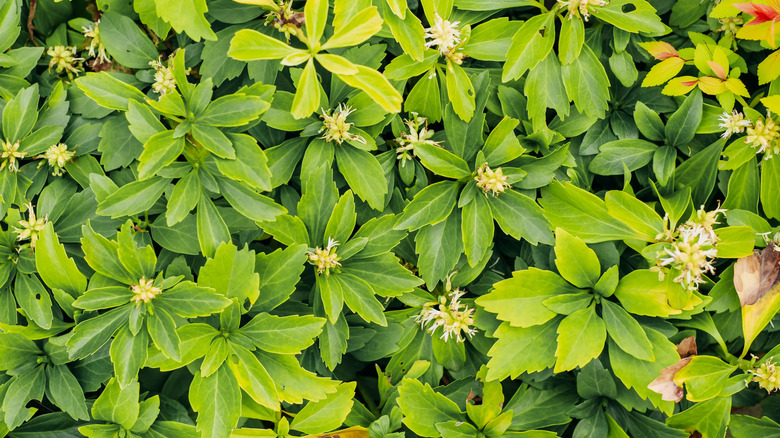The Ground Cover You Won't Want To Grow If You're Trying To Keep Mosquitoes Away
Using a ground cover plant can be a wonderful and low-maintenance way to beautify your yard, help retain soil moisture, and even prevent weed growth. However, not all ground covers are all created equal. One in particular could contribute to additional itching, and the need for extra bottles of Calamine lotion. The Pachysandra terminalis (Japanese pachysandra) is a popular ground cover that loves shade, especially flourishing in areas under trees. However, is also a plant that is said to attract mosquitoes – the pesky, potentially disease-carrying nuisances that can all but ruin an outdoor gathering. With that said, it's not actually the plant that mosquitoes love, it's the atmosphere around the plant, which provides the ideal conditions for these blood-sucking insects to reproduce and thrive.
Because the pachysandra creates loads of shade and moisture under its broad leaves, it effectively creates a mini mansion for adult mosquitoes to reproduce. Once a female has her fill of plasma, she can retreats to a damp pachysandra palace to lay her eggs. So if you're looking at some of the best ground cover options for your flower bed or garden, consider something other than the pachysandra to keep mosquitoes at bay.
How to mitigate pachysandra, and other ground cover options
Let's say you already have pachysandra and want to mitigate the mosquito-attracting qualities of the plant. Clipping the tips in the spring can encourage more air flow, while using cedar mulch underneath can similarly help temporarily repel mosquitoes, as they are repelled by the smell. However, because it is an aggressive spreader that grows easily once established, pachysandra can be hard to fully get rid of.
On the other hand, if you're starting from square one, you have options. One ground cover option that can help repel mosquitoes is Thymus citriodorus (lemon thyme). The perennial blooms lovely flowers, is appealing to pollinators, and works well in sunny areas, in addition to offering culinary usage in certain dishes. Most easily grown in USDA hardiness zones 5 to 9, lemon thyme also tolerates heat, drought, and moderate cold.
You can also try incorporating different kinds of ground covers in and around each other can help attract other insects that eat mosquitoes. Depending on your sun/shadiness levels, there are several useful options to look into, including Mitchella repens (partridgeberry), Phlox divaricata (woodland phlox), Iris castata (dwarf crested iris), Sedum turnatam (wild stonecrop), and Geranium maculatum (wild geraniums). With all of this in mind, it's important to realize that mosquitoes are still likely going to be a part of your summer, so it wouldn't hurt to stock up on some household stapes that repel mosquitoes.

